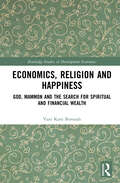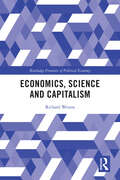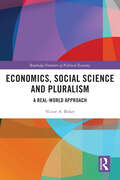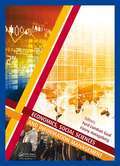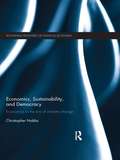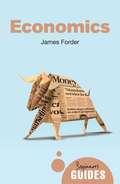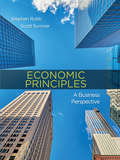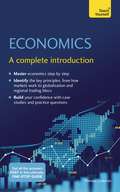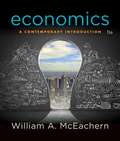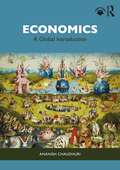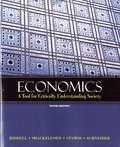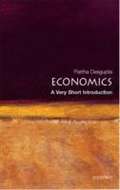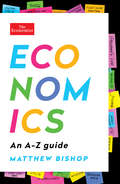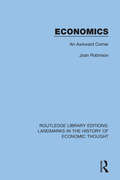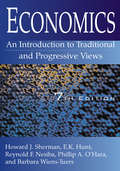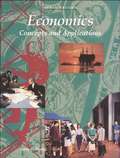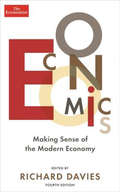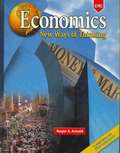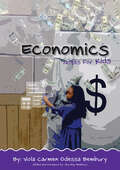- Table View
- List View
Economics, Reading Study Guide: Reading Study Guide
by Houghton Mifflin Harcourt StaffNIMAC-sourced textbook
Economics, Religion and Happiness: God, Mammon and the Search for Spiritual and Financial Wealth (Routledge Studies in Development Economics)
by Vani Kant BorooahMost books on happiness are concerned with answering, in their diverse ways, a basic question: how should I live? Such books assume, however, that the path to happiness lies entirely within one’s control. Happiness is simply a matter of doing certain things and refraining from doing certain other things. This book, however, takes a different view. It is that happiness is not always within our control but, instead, prey to the attitudes and actions of others. Following Jean-Paul Sartre’s aphorism, “hell is other people”, the broad theme of this book is that “unhappiness is other people”. In the language of economics, “other” people, through their attitudes and actions, create externalities – often negative - which serve to make “us” unhappy. The instruments for creating such externalities are intolerance and feelings of envy/superiority. This book expands on this theme in respect of three areas: religion, money, and prejudice. It is fair to say the existing (un)happiness literature, particularly in economics, does not take many of these externalities into account. Instead, the focus is, firstly, on identifying the factors, internal to oneself, that contribute to personal happiness and, secondly, on measuring the relative strength of their contribution. By contrast, an analysis of the externalities that people impose upon others lies at the heart of this book. Economics, Religion and Happiness will primarily appeal to students, academics and researchers across economics, psychology, philosophy, and sociology, and will also find an audience among those interested in exploring issues related to happiness in greater depth.
Economics, Science and Capitalism (Routledge Frontiers of Political Economy)
by Richard WestraVarious strains of heterodox economics have sought, and largely failed, to dismount orthodoxy from its dominant position. This book critiques the criticizers, explaining why heterodox economics challenges have faltered, and then presents a coherent alternative paradigm of its own. This simultaneously exposes the vacuousness of neoclassical economics, the limitations of heterodox critique and the subverting of Karl Marx’s revolutionary economic thought by his own disciples. The book draws in particular on two key intellectual traditions in making its arguments: critical realism and Marxism. From the refounding of critical realist philosophy of science in the hands of Roy Bhaskar, emphasis is placed upon the position that the ontological nature of the object of study determines the form of its possible science. However, in their theoretical constructions, neither orthodox economics nor heterodox economics problematizes the unique ontology of capitalism to the detriment of knowledge about the social world. The book maintains that a century of misthinking over Marx’s corpus has resulted in a missed opportunity to construct a paradigmatic alternative to orthodox economics. Drawing upon the tradition of the Japanese Uno approach to Marxism, and supported by Bhaskar’s development of critical realism as underlaborer for science, the book defends Marx’s writing in his monumental Capital as founding an economic science adequate to its ontological object of study. It then elaborates upon how Marxian economic theory exposes the hidden scourges of capitalism and what is required to unleash the potential of this theory for comprehensive analysis of capitalist vicissitudes, the study of economic life in precapitalist societies and the design of a desperately needed postcapitalist social order. Broadening its appeal as it sets out to reclaim Marx’s revolutionary legacy, this original volume critically traverses writings in mainstream and heterodox economics, cutting edge philosophy of science and Marxian political economy and introduces readers to a reconstruction of Marx’s Capital engineered in Japan. This provocative book is essential reading for everyone interested in heterodox economics, critical realism, Marxian economics and critiques of capitalism.
Economics, Social Science and Pluralism: A Real-World Approach (Routledge Frontiers of Political Economy)
by Victor A. BekerIn the work of most classical economists – including Smith and Keynes – theory was often embedded in application. But from the second half of the last century on, mainstream economics styled itself as “pure” economics, where the theory is presented in a very abstract form detached from any application. This book maintains that economics is a social science whose mission is to explain and, when possible, predict, phenomena of the real-world economy. The book argues that the first step to restore economics as a social science is to define what issues economics should address. Only after this research agenda is established should the appropriate methodology be chosen, not the other way around. In this respect, examples from other social sciences as well as from natural sciences are considered more appropriate models for economics rather than physics. Moreover, the need for a closer interaction with psychology, sociology and other social sciences is required to restore the discipline to that field instead of acting as a branch of applied mathematics. The book also argues for a more pluralist approach to economic education to enable prospective economists to understand real-world economic phenomena and potential policy solution. For this reason, a good economics education should necessarily include the study of economic history and of the institutional environment. This book is essential reading for anyone who wants to see economics return to its origins as a social science.
Economics, Social Sciences and Information Management: Proceedings of the 2015 International Congress on Economics, Social Sciences and Information Management (ICESSIM 2015), 28-29 March 2015, Bali, Indonesia
by Ford Lumban Gaol Fonny HutagalungThe 2015 International Congress on Economics, Social Sciences and Information Management (ICESSIM 2015), held 28-29 March 2015 in Bali, Indonesia, aimed to provide a platform for the sharing of valuable knowledge and experience in the context of changing economics and social settings. Information technology has changed many aspects in our life, inc
Economics, Sustainability, and Democracy: Economics in the Era of Climate Change (Routledge Frontiers of Political Economy #159)
by Christopher NobbsHow should we conduct economics in an era of climate change, natural resource depletion and population increase? These issues are systemic, and involve great uncertainties and long time horizons. This book contends that the free-market economics that has dominated capitalist democracies in recent decades is not up to the task; that the welfarist economics that preceded it, while preferable, also has inadequacies; and that what is required is an economics founded on ecological principles, greater respect for the laws of natural science, and a moral commitment to a sustainable future. The book commences with an exposition of major aspects of orthodox macroeconomic and microeconomic theory. It then explores the bounds of orthodox theory in relation to ethics, liberalism, ideology, society, the international economy, globalization, and the environment, and seeks lessons for a future economics. Issues raised by natural resource use and climate change are given particular prominence. Many of the issues of critical importance in coming decades involve not private goods but public goods: goods which markets are ill-equipped to deal with. In the resolution of these issues political processes will need to be engaged. The availability to each individual of clean air, clean water and adequate sustenance, goods which cannot be provided for by economic production alone, are of central concern. While acknowledging the importance of market processes, the author argues in favour of a more deliberative and democratic economy, the greater engagement of civil society, environmental human rights and responsibilities, and in favour of a World Environment Organization, change in the conduct of the World Trade Organization, and for economists to accept moral responsibility for the policies they advocate. Specific case studies are given and potential policies outlined. This book will be of interest not only to economists but also to citizens generally and students concerned with public affairs.
Economics: A Beginner's Guide (Beginner's Guides)
by James ForderAlmost everyone appreciates that economics is important. Promises are constantly made which relate to economic outcomes - 'no more boom and bust' was one from the last government - but rarely do things turn out as expected. Whether things go right or wrong, the consequences affect all of us. A proper understanding of the subject is essential to making our society successful.Readers are introduced to the essential building blocks of economic thinking through the exploration of real world economic issues. Crucially, Forder goes beyond a basics presentation of what economists say, and asks what economics is, what it does, and when it is useful.
Economics: A Business Perspective (Surveys In Economics)
by Rubb SumnerEconomic Principles: A Business Perspective leverages student fascination with business by drawing clear connections between fundamental economic theory and the business decisions that students—whether they are future CEOs, small business owners, managers, or independent workers—will make in their careers.
Economics: A Complete Introduction: Teach Yourself
by Thomas CoskeranEconomics is a huge subject, and this book is the perfect place to start. Designed specially for undergraduates, it includes features such as questions that may come up in exams, quotes from leading theorists that you can use in your essays, and case studies providing real-life examples. The book is written by Dr Thomas Coskeran, a lecturer at Durham University School of Business, who has been an advisor to both HM Treasury and the NHS. This really is the only book you need to start getting great results in economics.
Economics: A Complete Introduction: Teach Yourself
by Thomas CoskeranEconomics is a huge subject, and this book is the perfect place to start. Designed specially for undergraduates, it includes features such as questions that may come up in exams, quotes from leading theorists that you can use in your essays, and case studies providing real-life examples. The book is written by Dr Thomas Coskeran, a lecturer at Durham University School of Business, who has been an advisor to both HM Treasury and the NHS. This really is the only book you need to start getting great results in economics.
Economics: A Contemporary Introduction
by William A. McEachernEconomics has a short history but a long past. As a distinct discipline, economics has been around for only a few hundred years, yet civilizations have confronted the economic problem of scarce resources and unlimited wants for millennia. Economics, the discipline, may be centuries old, but it’s new every day, with fresh evidence that refines and extends economic theory. In this edition, the author draws on more than three decades of teaching and research to convey the vitality, timeliness, and relevance of economics.
Economics: A Global Introduction
by Ananish ChaudhuriEconomics affects our daily lives in crucial ways. We constantly hear about recessions and unemployment, inflation and cost-of-living crises, economic growth and inequality, climate change and carbon taxes, interest rates and house prices, and tariffs and trade wars. What does this all mean?Written in a highly engaging style, Economics: A Global Introduction cuts through the jargon to provide a comprehensive introduction to the basics of economics. This book includes applications of economic principles and insights from behavioural economics into contemporary issues such as global warming and the COVID-19 pandemic. This book is replete with real-world examples and anecdotes from politics, literature, film, and sports to help the reader grasp fundamental micro- and macroeconomic concepts. Student-friendly features include case studies, start-of-chapter learning objectives, discussion questions and answers, further reading suggestions, and mathematical appendices. This book is accompanied by useful digital resources, including lecture recordings, PowerPoint slides, and a test bank containing both multiple-choice and essay questions and answers. Suitable for students who may pursue further studies in economics, as well as those choosing a different field, Economics: A Global Introduction is the ideal textbook for providing students with an economic perspective on the world.
Economics: A Tool for Critically Understanding Society
by Tom Riddell Jean A. Shackelford Stephen C. Stamos Geoffrey SchneiderThe authors take a historical perspective, presenting economic theories and their connections to a wide variety of schools of thought.
Economics: A Very Short Introduction
by Partha DasguptaHere Partha Dasgupta, an internationally recognized authority in economics, presents readers with a solid introduction to its basic concepts, including efficiency, equity, sustainability, dynamic equilibrium, property rights, markets, and public goods. Throughout, he highlights the relevance of economics to everyday life, providing a very human exploration of a technical subject. Dasgupta covers enduring issues such as population growth, the environment, and poverty. For example, he explores how the world's looming population problems affect us at the local, national, and international level. Economics has the capacity to offer us deep insights into some of the most formidable problems of life. Here, Dasgupta goes beyond the basics to show it's innate effects on our history, culture, and lifestyles.
Economics: An A-Z Guide (Economist Books)
by Matthew Bishop The EconomistEconomics is all around us, essential to every aspect of our lives.But just how much does the average person understand about what Economics is for, how it underpins crucial decisions taken every day and how it has, and continues to, evolve?Step forward The Economist's official guide to Economics, written with the clarity and wit for which the newspaper is renowned and featuring bite-sized overviews of the most important economic ideas, concepts and terms.If you need to understand why a country's balance of payments is such a big deal , whether deflation is always a bad thing, or exactly why John Maynard Keynes or Milton Friedman were so influential, then dipping into this A-Z Guide will provide the answers.Primer, glossary, dictionary and guide, Economics offers everything you always wanted to know about Economics, but perhaps were afraid to ask.
Economics: An Awkward Corner (Routledge Library Editions: Landmarks in the History of Economic Thought)
by Joan RobinsonOriginally published in 1966, this book has enduring validity. In analysing the economic situation of the late 1960s Joan Robinson discusses the contradictions which arise from the need to readjust the organisation of society to the fantastic capacity for producing material wealth that capital accumulation and progress in technology have made possible. She maintains that the late twentieth century economic system is just an awkward corner in a continuing process of historical development .
Economics: An Introduction and Vocabulary
by Michael G. RukstadIntroduces students to some general tools of economics that will be useful in analyzing macroeconomic performance in a course on business, government, and the international economy. The four sections are: 1) the economy as a circular flow, 2) supply and demand, 3) aggregate supply and aggregate demand, and 4) an introduction to National Income accounting.
Economics: An Introduction to Traditional and Progressive Views (Routledge Advances In Social Economics Ser.)
by E. K. Hunt Reynold F. Nesiba Howard J Sherman Phillip O'Hara Barbara A. Wiens-TuersThis classic text offers a broader intellectual foundation than traditional principles textbooks. It introduces students to both traditional economic views and their progressive critique. Revised, expanded, and updated for this new edition, the text puts the study of microeconomics, macroeconomics, and globalization in their historical context. While covering the same topics as a traditional text, it also offers a richer discussion of economic history and the history of economic thought, including the ideas of Karl Marx, Thorstein Veblen, and John Maynard Keynes. This allows students to see economics as a way of understanding the world - as a lens for social analysis - rather than, as immutable truth or ideal to which the world should be molded.This completely revised edition incorporates new chapters on microeconomics and macroeconomics, as well as more graphs to enhance the theoretical presentations. Unlike the previous editions, it includes many pedagogical tools to encourage student participation and learning. Each of the 56 chapters opens with Learning Objectives, and key terms appear in boldface within the text and are listed at the end of each chapter. Other end-of-chapter material includes Summary of Major Points, Analytical Questions, and References. An online Instructor's Manual is available to professors who adopt the text.
Economics: Concepts and Applications
by Larry D. HodgeThe book speaks about all parts of the economy especially the kind of U.S. economy and other economies in other nations, the role of money and banking, the dependence of U.S. economy on other nations, trade and how nations decide what to trade.
Economics: Institutions and Analysis Fourth Edition
by Gerson Antell Walter HarrisThis text book keeps it simple. It's organized intelligently and it has an extended glossary with concise definitions of virtually every term mentioned in the text. So while economics is never easy to grasp, this book is written in such a straight-forward way, it makes it clearer than most economics text books.
Economics: It's Your Business
by Henry BillingsLearn about the meaning of economics, what affects it, its systems and the world's view about it.
Economics: Making sense of the modern economy
by Richard DaviesThe world of economics is changing. Years of turmoil in the global economy mean that nothing will ever be quite the same again. This is the starting point and theme of this radically revised Economist books classic, now available for the first time in America. Richard Davies, economics editor of The Economist, takes us on a journey through the paper's own analysis of the state of the world's economies, how we reached this point and what to expect in the next decade. He explores: what's gone wrong since 2008, why it's happened and how we can stop it happening again; the shifting focus of economics from banking to labor economics; the future hopes and challenges for the world economy. Along the way, we encounter the global economy laid bare, from banks, panics, and crashes to innovative new policies to improve how markets function; from discussions around jobs, pay, and inequality to the promise of innovation and productivity; from the implications of emerging markets and the globalisation of trade through to the sharing economy and the economics of Google and eBay. The result is a fascinating review of the global economy and the changing role of economics in the new world order.
Economics: New Ways Of Thinking
by Roger A. ArnoldIn this book--Economics: New Ways of Thinking--we want not only to present good, solid economics to you, but to show you how powerfully economic analysis explains many of the things that you encounter in your life. If you take a quick look at the features in this book, you will realize that this isn't your father's or grandfather's eco¬nomics book.
Economics: Notes for Kids
by Viola Carmen Odessa BemburyEconomics made easy through a child’s imaginative lens! This delightful book offers an accessible introduction to complex economic principles through whimsical drawings and simple yet insightful interpretations of topics like supply and demand, taxation, free trade and more. Blending innocence with wisdom, Economics: Notes for Kids flips traditional learning on its head. Difficult concepts become understandable and engaging when seen through the eyes of an inquisitive 6-year-old. Each page features the child’s pithy observations and questions accompanied by colourful doodles that aid visual learning. Far more than just a children’s book, this fun resource can enhance anyone’s economic literacy. Readers will enjoy the creativity and humour as they gain knowledge of the forces driving financial decisions and shaping our world. Economics is transformed into an adventure sure to spark lively discussions between children and adults alike. Experience again how a touch of imagination can breathe new life into education. Economics made easy through a child’s eyes! Rediscover the wonder of learning with Economics: Notes for Kids!

